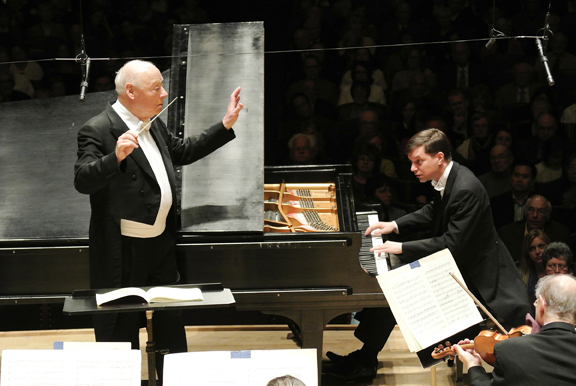A notable BSO debut set against Haitink’s mellow mastery

Till Fellner performing Mozart's Piano Concerto No. 22 with Bernard Haitink and the BSO Thursday night at Symphony Hall. Photo: Stu Rosner
In the central installment of his season-ending three-week stand with the Boston Symphony Orchestra, Bernard Haitink served up two of his favored composers, framing an impressive BSO debut by pianist Till Fellner Thursday evening at Symphony Hall.
The Austrian pianist, 40, has carved out a high-profile international career over the last decade and is particularly esteemed for his Beethoven, having performed the composer’s complete sonatas last season in New York, London and Vienna. Fellner proved an equally rewarding Mozartian in his BSO bow Thursday night in the Piano Concerto No. 22 in E flat, K.482.
The E-flat concerto calls for the largest orchestra of all Mozart’s works in the genre with pairs of horns, trumpets, clarinets, bassoons, flute and timpani. Yet, as solo protagonist, Fellner maintained his place in the spotlight, finding an illuminating middle ground between polished elegance and dynamic vigor. The pianist brought an individual rubato to Paul Badura-Skoda’s first-movement cadenza (none by Mozart survive) and in the bleak introspection of the Andante, Fellner’s pointillist shading explored the dark drama of the music without inflating it out of period.
The closing Allegro with its skipping child-song-like main theme was thrown off with a playful touch in Fellner’s lightly sprung style. The soloist eased into the aria-like contrasting motif with heartfelt warmth, threw in some dazzling bravura with Hummel’s slightly anachronistic cadenza, and rounded off the performance with the requisite ebullient charm.
Haitink’s big-boned accompaniment was alert to his soloist if fitfully out of synch with Fellner dynamically. The grandly spun orchestral playing seemed to be looking forward to the Romantic era down the road, while Fellner’s poised Classicism kept firmly within Rococo parameters.
Prelude to the Afternoon of a Faun has long held an elevated place in the BSO tradition, with Debussy’s evocative tone poem well served throughout the past century by this most Gallic of American orchestras under conductors such as Monteux, Munch, Ansermet and Ozawa.
Haitink’s objective lucidity has always been well suited to Debussy and so it proved again Thursday night. The Dutch conductor’s spacious direction allowed the hazy, evanescent textures to move with a kind of atmospheric inevitability, yet with sinew beneath the pellucid surface. Elizabeth Rowe’s flute solos sensitively conveyed the arboreal languor as did Malcolm Lowe’s silken violin playing. Too bad about the unmuffled bronchial outbursts that repeatedly intruded upon the performance.
Beethoven figures in all three of Haitink’s spring BSO programs, with the Ninth Symphony closing the season next week and the Symphony No. 6 presented Thursday night.
The approach of the orchestra’s conductor emeritus in Beethoven is fleeter and lighter on its feet than in decades past, largely to worthy effect.
Still, Haitink’s Beethoven has always been most effective in the cut-and-thrust drama of the odd-numbered symphonies rather than the lighter expression of the even-numbered works. For all his justly celebrated qualities, impish whimsy is not in Haitink’s portfolio and there were moments in this Pastoral symphony—the ‘Scene by the Brook,” the village band’s toneless wind piper—when the conductor’s sobriety of approach seemed to stint on the charm and humor at its heart.
Yet this was such a vital, magnificently played and otherwise vividly characterized performance that all doubts were swept aside. Haitink’s mastery in eliciting meticulous balancing and transparency allowed the BSO players to shine gloriously. There were numerous felicities, from Lowe’s zephyr-like trills in the second movement to the ensuing, wonderfully bucolic woodwinds to the double-basses’ ominously approaching, exploding and receding thunder. In the storm section Haitink and the BSO whipped up a cataclysmic tempest and the beneficent finale was rendered with just the right luminous nobility in Beethoven’s glowing pantheistic coda.
The program will be repeated 1:30 p.m. Friday and 8 p.m. Saturday. bso.org; 617-266-1200.
Posted in Performances